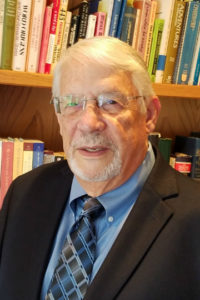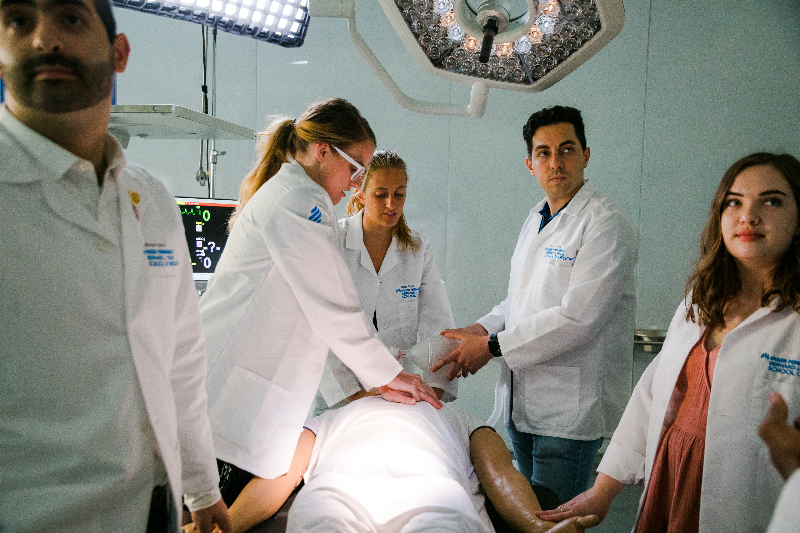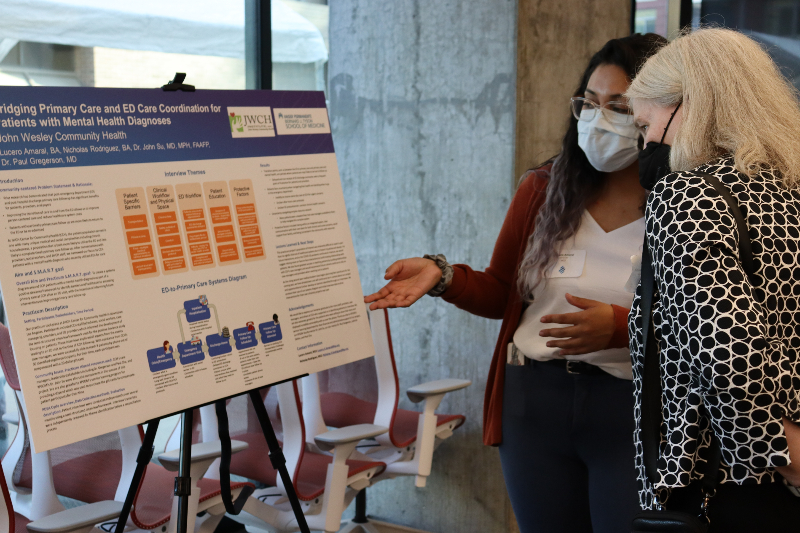Kaiser Permanente Bernard J. Tyson School of Medicine’s Simulation Center provides hands-on experience in a supportive environment.
Inside Perspective: Dwight W. Warren, PhD
Addressing the Science of Medical Education with Foundational Science
This is a series of first-person pieces from the Permanente physicians, clinicians, and educators on the ground floor of creating the new Kaiser Permanente School of Medicine.
by Dwight W. Warren, PhD
Who am I?
I am many things! I am a lifelong academic learner, educator, and scientist. As I transitioned into retirement, I was able to take on two activities that I love. The first, as a docent at the Los Angeles Zoo and Botanical Gardens, which allows me to share my love of animals with the community and takes me back to my educational “roots” as a zoology undergraduate major at the University of California at Berkeley. The second, as a consultant to Kaiser Permanente School of Medicine, and one of the first foundational scientists to join the educational team.

I’m also a husband, father, father-in-law, and grandfather. When I get involved in something that I am passionate about, I stay a long time. I was on the faculty of the University of Southern California Keck School of Medicine for over 40 years. During my time there I served as an organ system chair (endocrinology and reproduction), chair of the Department of Pharmacology and Nutrition, and associate dean for Curriculum. While serving in these positions, I gained a tremendous amount of knowledge about science and about medical education. Besides fulfilling the administrative duties of the educational positions, I always had a full-time commitment to medical education, research, and teaching of graduate students in biomedical science. I also expanded my educational expertise by teaching “Professionalism in Practice of Medicine.”
In 1999, I was offered a wonderful opportunity to head a new medical school at Florida Atlantic University (FAU). While leading the development of this school, I again gained more knowledge about the workings of a medical school and medical education. The science of medical education is expanding rapidly and it takes a great commitment to try and keep up with this ever-growing body of knowledge. I spent seven years at Florida Atlantic University (and maintained an appointment as adjunct professor of Physiology and Biophysics at USC) and had an amazing time there. When I first joined FAU, I was given an office, the help of an administrator, and an empty lot where I was to have a medical education building constructed. When I left, there was a new building, a faculty of researcher/educators, medical students, and graduate students. The first class of students finished their first two years of medical school and moved to the University of Miami Miller School of Medicine to complete their medical training.
I then returned to USC Keck School of Medicine where I taught pharmacology and professionalism until I retired in January 2017.
I love to travel but find it most rewarding to live in a place for an extended period so I can get to know new geographic areas and cultures. I spent almost two years in the Washington, DC, area at the National Institutes of Health and another year in Turku, Finland, at the University of Turku as a Fulbright Scholar. Travel has always been a great passion for our family.
What am I doing for the School of Medicine?
I was initially hired as a consultant in foundational (basic) sciences. At the time there were no foundational scientists to help guide what material should be included in the integrated medical curriculum of the new medical school. Also, there were no basic scientists to represent the point of view of foundational science in other aspects of the School of Medicine as it developed. We have now hired two more foundational scientists and are in the process of hiring more. We also are looking for a permanent chair for the department and are very encouraged with the strong pool of applicants that have applied for faculty positions as well as the chair of Foundational Science position.
I use my background in curriculum development to help craft a curriculum for our medical students that will be much more clinically oriented than most traditional medical schools.
In order to improve communication between the foundational scientists and the administration and other faculty at the Kaiser Permanente School of Medicine, I was appointed planning chair for Foundational Science. In this position, I use my background in curriculum development to help craft a curriculum for our medical students that will be much more clinically oriented than most traditional medical schools and also maintains a significant amount of foundational science so our students will be well prepared for the Step I exams from the National Board of Medical Examiners. I also provide leadership for the small developing department and make sure its opinions are heard.
How’s it going?
I am in the fortunate position of doing only what I enjoy in retirement, which is volunteering at the Los Angeles Zoo and Botanical Garden and working with the Kaiser Permanente School of Medicine team to develop what I hope will be a great medical school. Participating in all of the activities at the School of Medicine is a wonderful experience. It is always challenging and invigorating to start a new school or bring change to an established school. However, working at the School of Medicine has involved working with a group of administrators, faculty, and staff that are unique. The interaction of all individuals is more collegial than I have ever seen in any group, let alone a growing group. I truly look forward to working at the Kaiser Permanente School of Medicine every morning.
The school is progressing at a strong pace due to the dedication and interaction of many individuals working together, almost like a symphony orchestra. Each musician is playing his own instrument but complementing the other sounds of the other players so that in the end we will hopefully have a wonderful piece of music.
Dwight W. Warren, PhD, is the planning chair for Foundational Science at the Kaiser Permanente School of Medicine. Follow him on Twitter @dryeyedoc.


